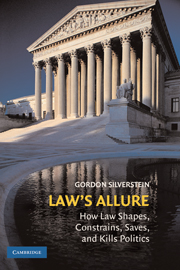Crossref Citations
This Book has been
cited by the following publications. This list is generated based on data provided by Crossref.
Graber, Mark A.
2008.
The Countermajoritarian Difficulty: From Courts to Congress to Constitutional Order.
Annual Review of Law and Social Science,
Vol. 4,
Issue. 1,
p.
361.
SILVERSTEIN, GORDON
2009.
The Law: Bush, Cheney, and the Separation of Powers: A Lasting Legal Legacy?.
Presidential Studies Quarterly,
Vol. 39,
Issue. 4,
p.
878.
Davis, Fergal
2010.
The Human Rights Act and Juridification: Saving Democracy from Law.
Politics,
Vol. 30,
Issue. 2,
p.
91.
Pollack, Harold A.
2011.
Health policy and the community safety net for individuals with intellectual disability.
Developmental Disabilities Research Reviews,
Vol. 17,
Issue. 1,
p.
44.
Silverstein, Gordon
2011.
U.S. War and Emergency Powers: The Virtues of Constitutional Ambiguity.
Annual Review of Law and Social Science,
Vol. 7,
Issue. 1,
p.
237.
Bybee, Keith J.
2012.
Paying Attention to What Judges Say: New Directions in the Study of Judicial Decision Making.
Annual Review of Law and Social Science,
Vol. 8,
Issue. 1,
p.
69.
Vanhala, Lisa
2012.
Legal Opportunity Structures and the Paradox of Legal Mobilization by the Environmental Movement in the UK.
Law & Society Review,
Vol. 46,
Issue. 3,
p.
523.
Feeley, Malcolm M.
2012.
Fates of Political Liberalism in the British Post-Colony.
p.
493.
Ginsburg, Tom
2013.
Consequential Courts.
p.
45.
Price, Richard S.
and
Keck, Thomas
2013.
Movement Litigation and Unilateral Disarmament.
SSRN Electronic Journal,
Kagan, Robert A.
2013.
Consequential Courts.
p.
199.
Kapiszewski, Diana
Silverstein, Gordon
and
Kagan, Robert A.
2013.
Consequential Courts.
p.
1.
Paris, Michael
2013.
The Nature of Supreme Court Power. By Matthew E. K. Hall. New York: Cambridge Univ. Press, 2011. 262 pp. $94.00 cloth. - Merely Judgment: Ignoring, Evading, and Trumping the Supreme Court. By Martin J. Sweet. Charlottesville and London: Univ. of Virginia Press, 2010. 240 pp. $35.00 cloth..
Law & Society Review,
Vol. 47,
Issue. 3,
p.
687.
Graber, Mark A.
2013.
Consequential Courts.
p.
363.
2013.
The Drug Wars in America, 1940–1973.
p.
418.
Ley, Aaron J.
2014.
The Costs and Benefits of American Policy-Making Venues.
Law & Society Review,
Vol. 48,
Issue. 1,
p.
91.
Höhn, Sabine
2014.
New Start or False Start? The ICC and Electoral Violence in Kenya.
Development and Change,
Vol. 45,
Issue. 3,
p.
565.
Kawar, Leila
2014.
Commanding Legality.
Journal of Law and Courts,
Vol. 2,
Issue. 1,
p.
93.
2014.
From Slave Abuse to Hate Crime.
p.
1.
Blackbourn, Jessie
2014.
Evaluating the Independent Reviewer of Terrorism Legislation.
Parliamentary Affairs,
Vol. 67,
Issue. 4,
p.
955.





